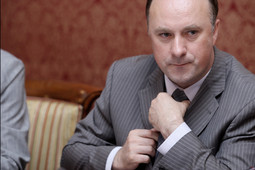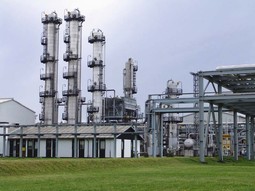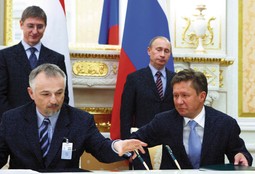MINISTER OF THE ECONOMY and Deputy Prime Minister Damir Polancec, who is also the President of the INA Shareholder’s Assembly and is completely under the influence of the INA Deputy CEO Zalan Bacs, irrespective of Croatia's national interestsThe Hungarians are assuming the role of policy makers in the Croatian energy sector. If the Hungarian model of the integration of the Croatian natural gas sector is adopted, separating it from INA, MOL will make about 4 billion kuna a year on Croatia's mineral resources, selling natural gas from Croatian sources at the prices of Russian natural gas, and Croatian consumers will pay for the most expensive natural gas in Europe. This plan, unfortunately, has the support of Deputy Prime Minister and the president of the INA shareholder's Assembly Damir Polancec, so that it is to be expected that, contrary to Croatian national interests, it will also be supported by Croatian Government. With its 47.5 percent stake MOL has already secured a dominant position in INA and runs the Croatian national oil company, which is the result of a poorly led privatisation process and substandard legislation on the privatisation of INA.
"Instead of Croatian Government taking into its hands the process of integrating all of the players in the natural gas sector, Deputy Prime Minister Damir Polancec, as the chief negotiator, is completely under the influence of Zalan Bacs, the deputy CEO and the INA executive financial director. Polancec accepts everything the Hungarians are seeking as regards the separation of the natural gas sector from INA into a separate state-owned Natural Gas company," says Nacional's source, a long-time advisor at the economy ministry. The state would have to buy up natural gas from INA and place it on the market by way of the new company. But the Hungarians are seeking new profits in the deal. The price of natural gas that INA imports from Gazprom will remain the same, but the current profits of 500 million kuna that INA makes through the sale of 3 billion cubic metres of Russian and domestic natural gas on the Croatian market is too little for the Hungarian owners and the new Russian co-owners of MOL. That is why MOL is imposing a solution on Croatian Government based on which the sale of the entire supply of Croatian natural gas production, of almost 2 billion cubic metres of natural gas a year, be risk-free for them, at prices equal to the high price of Russian natural gas (1.56 kuna/m3), but with all costs, obligations and further risk shifted to Croatia and Croatian consumers.
"If Polancec accepts Bacs formula Croatian Government will make a mistake with far-reaching consequences, Croatian consumers will pay the most expensive natural gas in Europe, the profits of selling off INA's domestic annual natural gas production of about 4 billion kuna will not end up in Croatia, or in Croatia's national budget, and Croatia will lose all control of its natural gas sector and become dependent on foreign energy policy. The effects will be felt by all of Croatia," points out a former INA director, with many years of international standing in the oil and natural gas business. One need be a great optimist to believe that Sanader's administration and the ruling HDZ could then too get away scot-free. From what has been demonstrated to date, however, in separating the natural gas sector from INA, and the shoddy negotiations on the list of Croatian participants to the 25 percent stake in the LNG Adria international consortium, Government is directly threatening the project for the construction of an LNG terminal in Omisalj and the security of natural gas supply. In addressing the issue of Croatia's independence in the supply of natural gas and securing the big business opportunity with a liquefied natural gas terminal in Omisalj, Croatian Government, above all Sanader and Polancec, instead of protecting Croatian national interests, are opening the door to shady dealings for many business interests, and the influence of foreign companies that will, very likely, try to thwart the construction of an LNG terminal on the island of Krk. A Russian delegation will be in Zagreb soon for the second round of negotiations on the possible passage of the Southern Stream natural gas pipeline through Croatia. If Croatian Government summons up the courage to define its own energy strategy, in line with national interests, heeding the advice of domestic oil and economic experts, which it has to date practically not acknowledged, and grabs its big opportunity, the Russians will accept Croatia's conditions for the construction of the natural gas pipeline through Croatia, which is very important for them, and Government will have resisted the pressures that are threatening the construction of the LNG terminal at Omisalj.
ZALAN BACS, the deputy CEO and the executive director of finances at INA, wants to separate Croatian natural gas from INA and sell it on the market via a new, separate Natural Gas company at the price of Russian natural gas, and in the process make 4 billion kuna a yearIt is quite clear that the state has to play an important role in managing energy, and that the sector cannot be abandoned to a neoliberal model, especially not during a massive financial and energy crisis. If the Croatian oil sector has in fact been lost, in the natural gas sector all energy players need to be integrated as soon as possible. Without the integration of the suppliers, storage facilities, transporters and distributors of natural gas with the economy ministry there can be no long term or stable supply of natural gas. Government must play the dominant role in an integrated natural gas sector. Now, in the splintered natural gas sector someone else is always responsible for every slip up, and everyone, allegedly, did all they could - even during the big crisis in January, when the system practically caved in. There are now as many as 300 million cubic metres of natural gas in the Okoli storage facility, and no one knows exactly what to do with it. The Hungarian owners of INA want to do with it what they succeeded with oil - to control Croatian energy policy in the sector. Above all to, without any risk to them, sell all domestic production of natural gas and all supplies, but not at reasonable prices, but at the price at which we import natural gas from Russia. At stake are 1.6 to 2 billion cubic metres from the northern Adriatic and Pannonia. Zalan Bacs' idea, with the support of Polancec, would see the state buy up natural gas from INA, set up its own company, Natural Gas, and sell it on the market. INA would sell the natural gas to a state-owned company. That would rid INA of the cost of selling and the business risk, which would be assumed by the new Natural Gas company, as it has to achieve the agreed upon price, find buyers, run the finances, cover all transport and storage costs and also cover possible losses.
In this kind of decision from INA - in which the Croatian members of the board did not participate, and who have in a way distanced themselves from it, fully aware that it is contrary to national interests - the Croatian oil company in the majority ownership of MOL also wants to shift to the new Natural Gas company the obligation to supply protected consumers, even though the Natural Gas Market Act stipulates that this is an obligation of INA through to 2014. Croatian Government needs to separate the natural gas sector from INA as soon as possible and take full control of it. To date INA has been the heart of the Croatian natural gas sector, managing 3 billion cubic metres of natural gas, while major buyers like HEP (the national electric power authority) and Petrokemija Kutina were protected consumers. INA earned nothing from Gazprom on the sale of natural gas imported from Russia. But it did not lose money either. But the Hungarian owners of INA claim that they are permanently losing money in the natural gas sector, because they sell natural gas from Croatian sources at prices lower than that of Russian, imported, natural gas. That, however, is quite normal, because everything the Russian's can get on the market as the dominant, at the moment practically the monopolistic supplier of natural gas to Europe, is built into the price of expensive Russian natural gas.
PART OF THE INA natural gas sector, now owned by MOL; the central natural gas station in MolveCroatian Government has to move quickly to take control of the Croatian natural gas sector, integrate it, but INA has to participate in this as the producer. "The price of natural gas from domestic sources can be paid to INA, but based on the recognition of justified costs and reasonable profits. The price of Croatian natural gas cannot be the same as that of Russian gas; domestic consumers cannot pay for Croatian natural gas the price they pay for Russian gas. And Croatia has to take its share of the money from this, and not allow money to leak out of the country, because that would be a deliberate sell off of the nation's wealth," warns a prominent oil and natural gas expert.
By supporting the ideas and plan of the INA majority owner MOL, Polancec is backing a strategy that is contrary to Croatian interests. As the economy minister and deputy prime minister, Polancec is obliged to protect Croatian national interests and to abide by the Croatian Constitution. But he is also the president of the INA Shareholder's Assembly and cares more for the decisions made by the company, i.e. its majority owner. Minister and Deputy Prime Minister Polancec and president of the INA Shareholder's Assembly Polancec are in a direct conflict of interest. Insofar the decisions of the economy ministry and Government on bringing order to the natural gas sector are quite contrary to the decisions and interests of Government when the deputy prime minister signs them as the president of the INA Shareholder's Assembly. Deputy Prime Minister Polancec turns only to Zalan Bacs on everything that is to be done, and does not count much on the other experts and top people in INA. And that is significant. If Croatian Government does in fact want to pool the Croatian natural gas sector, it should be made clear under what conditions this will take place, what obligations will be undertaken by Government, and which by the company that is to be separated from INA. The Hungarians made a mistake and sold their natural gas sector to Germany's EON. Now, through INA, they want to get back into the lucrative natural gas business, get into the ownership structure of the LNG terminal on the island of Krk and take over the supply of Russian natural gas, including the gas that would come by way of the Southern Stream. Something that is not acceptable for Croatia.
Government is at pains to secure the 25 percent Croatian participation, i.e. 1 billion euro, in the Adria LNG consortium, for the construction of the LNG terminal in Omisalj. At this moment, besides itself, Government sees INA, HEP, Petrokemija Kutina, Plinacro and the Zagreb Municipal Gasworks in this 25 percent share. With the illogical offer to INA of the Croatian share in the LNG Adria consortium, we are drawing Hungarian and Russian capital into the game, who may obstruct the construction of the terminal at Omisalj. By doing so Government is endlessly drawing out the agreement among the Croatian partners, wasting time and delaying the start of construction, irritating the interested German, French, Austrian and other partners in the consortium, who will, in the end, got to Trieste and invest there in the construction of an LNG terminal. The loss of time and the unwillingness of Croatian Government to make key moves are increasingly reducing Omisalj's advantage over Trieste.
MOL CHAIRMAN Zsolt Hernadi (bottom row, left) with Gazprom CEO Alexei Miller (down, right), Hungarian Prime Minister Ferenc Gyurcsany and Vladimir PutinThere is no reason for Croatian Government to not itself set up LNG Croatia and without other Croatian partners be a shareholder in the Adria LNG consortium. Croatian Government is responsible for the strategic reserves and security of supply. Why then does Croatian Government not set up a Croatian company with a 25 percent share in Adria LNG, which would secure the start of construction of the LNG terminal at Omisalj, taking advantage of the readiness of foreign investors, and only then, when the project gets off the ground, cede, sell or grants its shares to individual energy sector players, or hold on to them. That would send a powerful political message. Government would itself enter the Adria LNG consortium, integrate the natural gas business, and can always sell off the shares to private investors. In that way Croatia would still get on board the Adria LNG project on time, retain its 25 percent, promote and secure a major business opportunity for Omisalj and Croatia, and retain a freer and real partnership and negotiation position towards the Russians and those who advocate the passage of the Southern Stream through Croatia, which is Croatia's strategic interest, but not at all costs. But what do we need that if we can quickly sell off our natural gas business, pay for expensive energy and a high price for natural gas.
Omisalj LNG terminal project threatened
By separating the natural gas sector from INA Government is directly threatening the project for the construction of an LNG terminal at Omisalj and the security of natural gas supply. In addressing the issue of Croatia's independence in the supply of natural gas and securing the big business opportunity with a liquefied natural gas terminal at Omisalj, Croatian Government, instead of protecting Croatian national interests, is opening the door to the influence of foreign companies that will, very likely, try to thwart the construction of an LNG terminal on the island of Krk. If Croatian Government succeeds in defining its own energy strategy, it will prevail against the pressures that aim to undermine the construction of the terminal.
Getting to the profits by creating a new Natural Gas company
The Hungarian owners of INA want to do with natural gas what they succeeded with oil - to control Croatian energy policy in the sector. Above all to, without any risk to them, sell all domestic production of natural gas and all supplies, not at reasonable prices, but at the price we import natural gas from Russia. At stake are 1.6 to 2 billion cubic metres from the northern Adriatic and the Pannonia. Zalan Bacs' idea, with the support of Polancec, would see the state buy up natural gas from INA, set up its own company, Natural Gas, and sell it on the market. INA would sell the natural gas to a state-owned company. That would rid INA of the cost of selling and the business risk, which would be assumed by the new Natural Gas company, as it has to achieve the agreed upon price, find buyers, run the finances, cover all transport and storage costs and also cover possible losses.
In this kind of decision from INA - in which the Croatian members of the board did not participate, and who have in a way distanced themselves from it, fully aware that it is contrary to national interests - the Croatian oil company in the majority ownership of MOL also wants to shift to the new Natural Gas company the obligation to supply protected consumers, even though the Natural Gas Market Act stipulates that this is an obligation of INA through to 2014. The Hungarian owners of INA claim that they are permanently losing money in the natural gas sector, because they sell natural gas from Croatian sources at prices lower than that of Russian, imported, natural gas.








